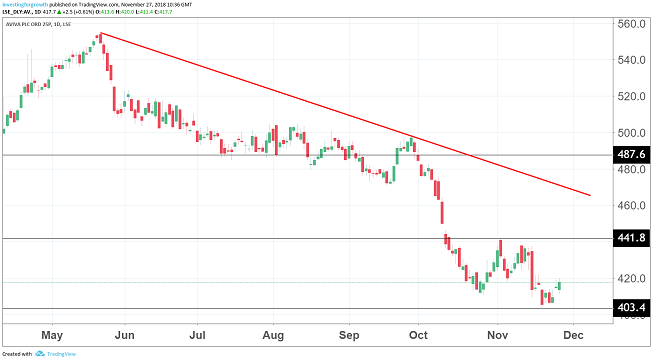Stockwatch: Scope to lock in a 7% yield
27th November 2018 10:40
by Edmond Jackson from interactive investor
Down at a two-year low, companies analyst Edmond Jackson believes now could be a good time to follow the CEO and buy a stock which offers long-term value.

As I've recently detailed with Standard Life Aberdeen and Legal & General Group there are now some attractive yields in the insurance sector as negatives have conflated to cut share prices.
Of particular interest is life-related business where only a few insurers are able to support bulk annuities on the scale required by direct benefit pension schemes – a competitive moat in contrast with general insurance for homes/cars, that's also attracted regulatory attention.
A latest probe by the Financial Conduct Authority into home/car insurance pricing amid complaints about how policy renewal costs soar, typifies such risk, the most exposed example being Direct Line Insurance Group whose stock trades at a three-year low yielding 7.5%.
Macro issues weigh too: Brexit heralds uncertainty as to European market access and, if the UK economy slows, then to what extent might consumer demand be affected? Financial stocks tend to be perceived as leading the economy, best bought in the trough of a recession and sold as the economy matures.
Yet with cash returns unlikely to rise by much, equities that are able to sustain, or even grow their dividend payments have appeal and, if the feared risks don't prove so bad, then stock re-ratings are baked in for the medium term.
CEO buying also reflects a five-year turnaround completed
A new chief executive at FTSE 100-listed Aviva bought £105,750 worth of shares at 423p on 7 November, after a turnaround specialist spent nearly six years streamlining the group from 28 markets to 14, focusing on areas of competitive strength and investing in new initiatives such as digital.
The chairman declared last October:
"He leaves the group in a far stronger state than when he joined...strengthened balance sheet...delivering solid earnings growth."
Aviva is listed in the life insurance sector, general insurance representing a modest 13% of group profits. Its stock has fallen 27% this year to about 410p currently, not as low as 346p around the EU membership referendum but at the low end of a five-year range despite its underlying turnaround.

Source: TradingView (*) Past performance is not a guide to future performance
The table (below) shows volatile financial performance, but management presently guides for operating earnings per share growing by 5% in 2018 after 4% was achieved at the interim stage, and expresses confidence thereafter.
Completion of a share buyback programme should also help earnings per share (EPS), although I'd be wary about assuming forecasts in the table that result in highly attractive PEG ratios of 0.2 to 0.4 (the price/earnings (PE) multiple divided by the earnings growth rating, where sub 1.0 is deemed to offer value).
Encouragingly, the interim dividend rose by 10%, representing a fourth consecutive half-year of double-digit dividend growth, this trend seemingly buttressed by an £11 billion capital surplus. This relates to EU stipulations on capital, insurance companies must hold to mitigate insolvency risks, in which context a circa 25p ordinary dividend (as forecast) would cost £1 billion.
Management speaks of a "total surplus capital deployment of £2 billion" this year, on debt reduction and bolt-on acquisitions, with £400 million remaining.
"Our preference remains to invest in our businesses and we remain on the look-out for bolt-on acquisition opportunities."
So, I would not speculate on special dividends, though an implied £9 billion remaining surplus should at the very least underpin ordinary share dividend growth. Thus, there is scope to lock in a 7% yield - with growth prospects – and capital upside too, if and when this yield is judged generous against Aviva's overall risk profile.
Reverse in investment income dents reported profit
Interim results showed net earned insurance premiums up 13.6% like-for-like to £13.8 billion, however, net investment income plunged from £10.8 billion into to a £0.5 billion loss, hence statutory interim pre-tax profit down from £1.0 billion to £0.4 billion.
A more thorough explanation of this would have helped – it's hardly as if Aviva's reporting lacks detail on group complexities – given October was a relatively more volatile period for financial markets, although income was specified.
This draws attention to insurance groups' investment operations (as principal, e.g. to manage annuity liabilities) being at risk from financial markets' change.
If the equities bull market has broadly peaked as the credit cycle rolls over - and more worryingly, say a scenario where US tax cuts late in the cycle result in stagflation, with China trade issues dragging on – then the stockmarket may continue to rate insurers cautiously.
So, if you are overall bearish then it may be more comfortable to watch-and-wait. It's a tricky balance where capital protection vies against the likelihood circa 7% yields won't be offered forever unless interest rates soar.
| Aviva - financial summary | Consensus estimates | ||||||
|---|---|---|---|---|---|---|---|
| Year ended 31 Dec | 2013 | 2014 | 2015 | 2016 | 2017 | 2018 | 2019 |
| IFRS3 pre-tax profit (£m) | 1,281 | 2,281 | 1,413 | 1,193 | 2,003 | ||
| Normalised pre-tax profit (£m) | 1,559 | 2,420 | 1,730 | 1,383 | 2,193 | 1,564 | 2,292 |
| IFRS3 earnings/share (p) | 21.8 | 47.7 | 22.8 | 15.1 | 15.1 | ||
| Normalised earnings/share (p) | 30.7 | 51.8 | 29.0 | 19.4 | 30.3 | 44.7 | 53.5 |
| Earnings per share growth (%) | -26.7 | 68.7 | -44.0 | -33.1 | 56.3 | 47.4 | 19.6 |
| Price/earnings multiple (x) | 13.5 | 9.2 | 7.7 | ||||
| Price/earnings vs growth (PEG) | 0.2 | 0.2 | 0.4 | ||||
| Historic annual average P/E (x) | 16.2 | 9.9 | 15.2 | 26.4 | 16.3 | ||
| Dividend per share (p) | 14.6 | 15.2 | 19.0 | 21.5 | 24.3 | 25.0 | 28.9 |
| Dividend growth (%) | -43.8 | 4.5 | 24.6 | 13.0 | 13.1 | 3.1 | 15.6 |
| Dividend yield (%) | 5.9 | 6.1 | 7.0 | ||||
| Covered by earnings (x) | 1.9 | 3.0 | 1.6 | 0.9 | 1.2 | 1.8 | 1.9 |
| Net asset value/share (p) | 423 | 414 | |||||
Source: Company REFS Past performance is not a guide to future performance
Life-related business drives group profitability
Life business represented 96.8% of interim operating profit after taking into account central office and other costs. Within this segment the UK contributed 60% and continental Europe 30%, the rest chiefly Asia, hence the significance of the outcome of Brexit talks as regards financial services, including what compromise can be struck on "passporting" into the European Economic Area to serve EU customers.
Earlier this year, Aviva switched its Irish policy holders to a newly created Irish domiciled company, but it remains to be seen whether using local operations this way will prove a reliable way around the EU's intention that any country leaving the single market must be seen worse-off.
It's another macro risk explaining insurance groups' de-ratings to exact high yields; so, if you believe Mrs May's deal will eventually pass once MPs stare at the reality of "no deal", even if that takes a second parliamentary vote, then buy now. If you fear that uncertainties will fester into chaos, then watch-and-wait.
What of the 8.75% cumulative preference shares?
There are £450 million of these "prefs" (AV.A), which have been a favourite for conservative investors seeking a relatively secure high yield. But this was jolted last March when Aviva threatened to cancel them in the final stage of a group restructuring, citing their £38 million annual cost.
Having traded at a premium to par value, their market price plunged from 175p to near 120p before investor action halted the plan, hence a bounce to 160p. The price has since trended downwards near to 140p after the US Federal Reserve has indicated it will continue monetary tightening, given an inverse relationship between bond prices and interest rates.
So, the prefs' situation is not necessarily lower-risk than the ordinaries, in the short to medium-term, despite the historic pattern of long-term bond prices trading inversely to equities. If you believe this will bear out eventually, then it’s possible to consider holding both equity and prefs.
A net 'buy' stance buffeted by uncertainties
Key factors impacting Aviva may not dissipate soon, but considering the group's streamlining and strong position in annuities, it is understandable an incoming CEO is comfortable buying equity now: the ordinaries offer long-term value despite macro risks that could yet see lower market prices.
A logical response to such uncertainties is to average-in, within an overall stance of: Buy.
*Horizontal lines on charts represent levels of previous technical support and resistance. Trendlines are marked in red.
Edmond Jackson is a freelance contributor and not a direct employee of interactive investor.
These articles are provided for information purposes only. Occasionally, an opinion about whether to buy or sell a specific investment may be provided by third parties. The content is not intended to be a personal recommendation to buy or sell any financial instrument or product, or to adopt any investment strategy as it is not provided based on an assessment of your investing knowledge and experience, your financial situation or your investment objectives. The value of your investments, and the income derived from them, may go down as well as up. You may not get back all the money that you invest. The investments referred to in this article may not be suitable for all investors, and if in doubt, an investor should seek advice from a qualified investment adviser.
Full performance can be found on the company or index summary page on the interactive investor website. Simply click on the company's or index name highlighted in the article.
Disclosure
We use a combination of fundamental and technical analysis in forming our view as to the valuation and prospects of an investment. Where relevant we have set out those particular matters we think are important in the above article, but further detail can be found here.
Please note that our article on this investment should not be considered to be a regular publication.
Details of all recommendations issued by ii during the previous 12-month period can be found here.
ii adheres to a strict code of conduct. Contributors may hold shares or have other interests in companies included in these portfolios, which could create a conflict of interests. Contributors intending to write about any financial instruments in which they have an interest are required to disclose such interest to ii and in the article itself. ii will at all times consider whether such interest impairs the objectivity of the recommendation.
In addition, individuals involved in the production of investment articles are subject to a personal account dealing restriction, which prevents them from placing a transaction in the specified instrument(s) for a period before and for five working days after such publication. This is to avoid personal interests conflicting with the interests of the recipients of those investment articles.